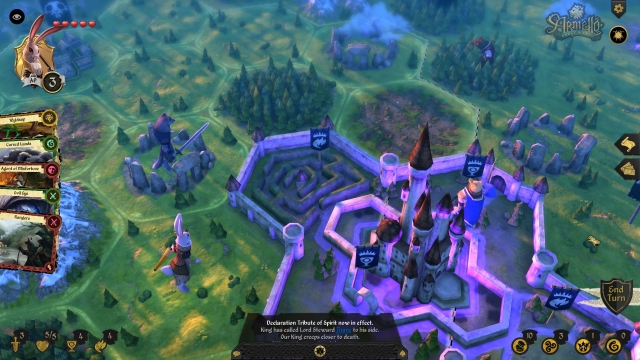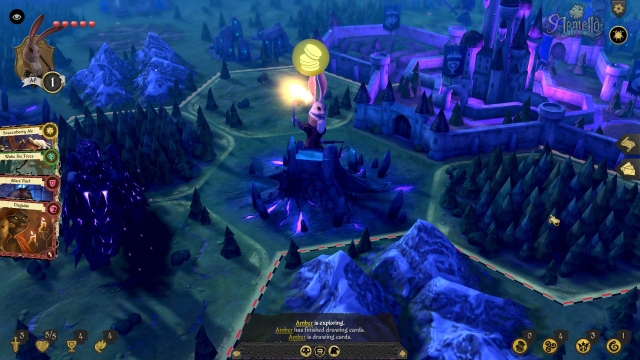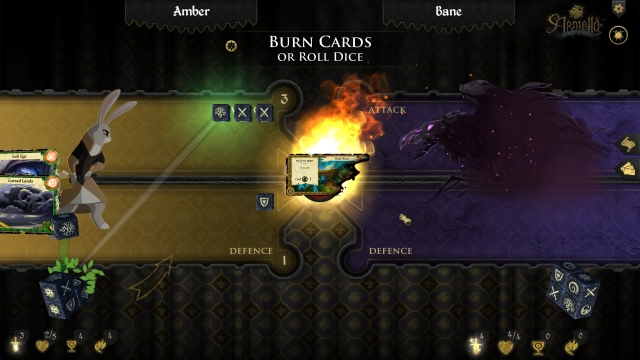
Armello Preview
Videogames have historically taken a lot of hints from boardgaming; it’s a point I argued rather strongly in a recent feature piece. What’s more, there are plenty of fantastic games that have used a direct boardgame style to find success - Sid Meier’s Civilization probably being the best example. There’s the Risk element to Total War, D&D (OK, admittedly not a proper boardgame, but still) influencing just about every fantasy RPG ever, not to mention the ever-increasing number of direct videogame translations of popular tabletop games. Yet despite all of this, a videogame that builds its own boardgame-esque world, filled with inventive systems, clever player interactions and distinctive computerisation (I’ll get to this), is something of a rare breed in this day and age.
This is, I assume, a large part of the reason the Kickstarter for Steam Early Access title Armello went over £100,000 over its initial goal. This is a videogame directly, unashamedly, attempting to inject the magic of boardgaming into its very core. Indeed, when you start up a game, that influence is instantly clear. The player is introduced to a hexagonal-grid map designed to look like some sort of fairytale cartoon. All around are pretty little details like towns, mountains, caverns and swamps; even a huge castle in the centre of the playing field with a sickly king inhabiting it. But then, those features are more than just details, they’re crucial elements of Armello, and the beginnings of a brilliantly designed boardgame/videogame hybrid.

The reason Armello fits so well into this category is the simple fact that a lot of the game could easily be played in the flesh, with little cardboard pieces. Yet there are also enough computerised working parts to prevent the classic ‘wouldn’t this actually be more fun as a proper boardgame’ question. The rules of play take a couple of games to get used to, but it’s pleasantly simple while remaining challenging and interesting even after several hours of play. Armed with a single anthropomorphic hero, the player must move around the map within a certain number of action points completing dynamic quests, looting caves, dealing with troublemakers and generally gaining Prestige.
The actions themselves are pretty simple, just move onto the right hex and either select a single action in a quest or leave it all to fate with a cave. You can also pick a fight with dark creatures, the King’s guard or with one of the other three players. Yes, this is a game that’s happy to let players go at it tooth and nail in a battle of wits and strategy. As with the aforementioned Civilization, there are multiple ways to win a game in Armello: first, complete enough quests and kill enough baddies to earn lots of prestige, the winner being the person who has the most by the time the King dies after a certain number of turns. Or you could scour the map for four spirit stones and bring these to the King, then again you could just straight up take him on and kill him.

During my time with the Early Access version of the game, I found that the prestige victory was most common, although players did slowly became more able with collecting spirit stones. These time dependant conditions do give Armello a brilliant sense of urgency despite the ultimately slow and deliberate pace. Every slight delay to your plans, be it an attack from another player, a surprise teleporter in a cave or whatever else the game throws at you, feels like a stab in the back - but never enough to make you feel as though you’re not capable of winning. This all comes together to form a fantastically enjoyable game. There are a lot of moving parts, but what makes Armello a great videogame is that the player rarely has to worry about the underlying systems. While in the flesh the players would have a lot to monitor and organise, most of the confusing details are handled by the game. That’s a great move from Australian developer League of Geeks, using the tools at hand to make this more than a boardgame ‘wannabe’.
It helps that Armello has some excellent underlying systems; most are classic boardgame mechanics, but they’re handled with style. The combat mechanic is a simple dice affair, but neat touches like realistic dice physics and smart integration with the game’s card play make it a cut above the norm. It can lead to some seriously tense duels that, like the best boardgame combat systems, bring just the right amount of luck into play. That card play is also a neat addition to the game; this allow players to make obvious changes like boosting health and other stats, as well as equipping weapons, gaining followers and placing ‘perils’ that are essentially traps placed to hinder the other players. Effective use of these cards is arguably the way to win a game in Armello, which is great considering the huge range and diversity they represent.

As I’m sure you can tell, Armello impressed me a great deal. I’ve seen some shambolic games try to replicate this concept; the typical issue is that the games would just be better with a bunch of mates around a table. Armello dodges that bullet with a computer-reliant game that feels perfectly suited to solo play. Of course, that doesn’t mean you should avoid the multiplayer offerings, as despite the game still going through beta testing there’s plenty of opportunity to test your ability against real people. Although online play can be a tad slow at times, it’s definitely the best way to play as the AI do become somewhat incompetent once you’re at a certain skill level. It’s a pretty game too; that cartoon style fits the mechanics excellently creating an ideal tone for a game of this sort.
League of Geeks still has some work to do before release. More characters beyond the standard four are expected and welcome, so too are more cards that should tune up the balance of the game. AI improvements are also consistently in the works, so that dispels my biggest issue so far. It must be said that as far as Early Access games go, League of Geeks seem to have things in hand, so there should be plenty of content available once the final game is released. Yet while that’s obviously great, it’s the brilliant game that already stands in Armello that really does the selling. Even with work yet to be done, this is a thoughtfully designed boardgame-inspired title that any strategy gamer should give a look. I’m happy to recommend the game even at this point in development, so I’m obviously really looking forward to see how the end product shapes up.








COMMENTS